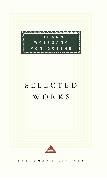One of the towering figures of world literature, Goethe has never held quite as prominent a place in the English-speaking world as he deserves. This collection of his four major works, together with a selection of his finest letters and poems, shows that he is not only one of the very greatest European writers: he is also accessible, entertaining, and contemporary.
The Sorrows of Young Werther is a story of self-destructive love that made its author a celebrity overnight at the age of twenty-five. Its exploration of the conflicts between ideas and feelings, between circumstance and desire, continues in his controversial novel probing the institution of marriage, Elective Affinities. The cosmic drama of Faust goes far beyond the realism of the novels in a poetic exploration of good and evil, while Italian Journey, written in the author's old age, recalls his youth in Italy and the impact of Mediterranean culture on a young northerner.
Translators include W. H. Auden, Louise Bogan, David Constantine, Barker Fairley, and Elizabeth Mayer


